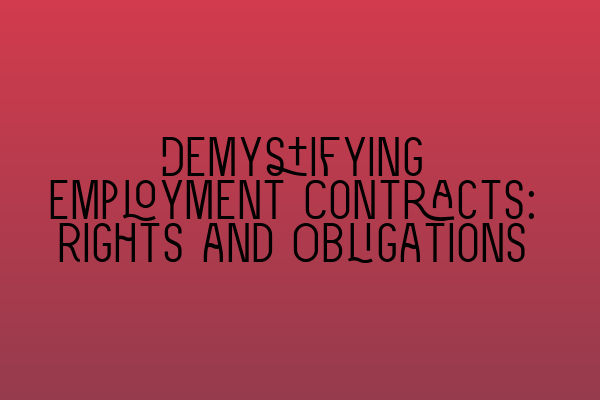Demystifying Employment Contracts: Rights and Obligations
Employment contracts play a vital role in the professional relationship between employers and employees. They establish the rights and obligations of both parties, ensuring a fair and transparent working arrangement. However, employment contracts can often be shrouded in mystery and confusion. In this blog post, we aim to demystify employment contracts by providing a clear understanding of the rights and obligations they entail.
Understanding Employment Contracts
Employment contracts are legally binding agreements between an employer and an employee. These contracts outline the terms and conditions of employment, including job responsibilities, working hours, compensation, and benefits. They serve as a reference point for both parties, ensuring that all parties are aware of their rights and obligations.
Rights of Employees
Employees are entitled to various rights under employment contracts and applicable labor laws. These rights include, but are not limited to:
- Right to Compensation: Employees have the right to receive fair compensation for their work, which includes wages, salaries, bonuses, and any other agreed-upon benefits.
- Right to a Safe and Healthy Work Environment: Employers have an obligation to provide employees with a safe and healthy work environment, free from hazards and harmful conditions.
- Right to Fair Treatment: Employees have the right to be treated fairly and without discrimination based on race, gender, age, religion, or any other protected characteristic.
- Right to Privacy: Employees have a reasonable expectation of privacy in the workplace, and employers must respect their privacy rights within legal boundaries.
These are just a few examples of the rights that employees are entitled to under employment contracts. It’s essential for employees to be aware of their rights and ensure that their employers fulfill their obligations.
Obligations of Employees
Employment contracts also outline various obligations that employees must fulfill. These obligations may include:
- Performing Job Duties: Employees are obligated to perform their job duties diligently, efficiently, and to the best of their abilities.
- Complying with Company Policies: Employees must adhere to company policies, rules, and regulations, which may include codes of conduct, dress codes, and confidentiality agreements.
- Protecting Company Assets: Employees have an obligation to protect and preserve company assets, including intellectual property, trade secrets, and confidential information.
- Respecting Confidentiality: Employees must maintain the confidentiality of sensitive company information and not disclose it to unauthorized individuals.
These are just a few examples of the obligations that employees are expected to fulfill under their employment contracts. By meeting these obligations, employees contribute to a positive work environment and the success of their employers.
Seeking Legal Advice
If you have questions or concerns about your employment contract, it is advisable to seek legal advice. A solicitor specializing in employment law can review your contract, provide guidance on your rights and obligations, and help you address any issues or disputes that may arise.
Further Reading:
- SQE 1 Practice Exam Questions
- SQE 1 Practice Mocks FLK1 FLK2
- SQE 2 Preparation Courses
- SQE 1 Preparation Courses
- SRA SQE Exam Dates
Understanding your employment contract is crucial to ensure a harmonious and fair working relationship. By familiarizing yourself with your rights and obligations under the contract, you can navigate the professional landscape confidently. Remember, seeking legal advice is always a prudent approach when it comes to matters of employment contracts.
